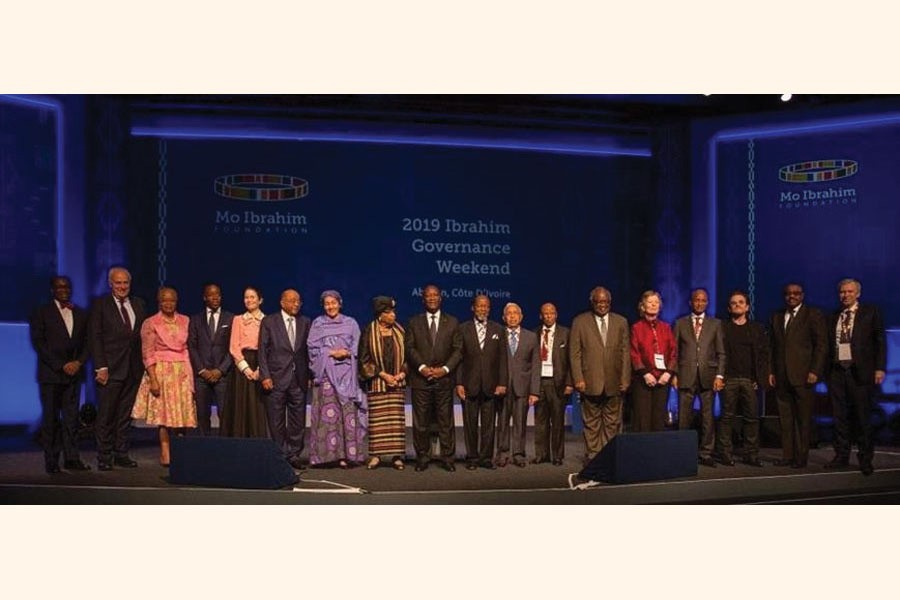In recent years, images of young Africans attempting to reach Europe, sometimes through the most daring and desperate routes, have become a fixture on global and national news channels. Cynical politicians in Europe and the United States have argued, for the sake of winning votes, that these (largely male) immigrants are "invading" their countries, threatening to steal locals' jobs, or worse.
Nothing could be further from the truth. As we were reminded during the 2019 Mo Ibrahim Foundation Governance Weekend (held in Abidjan 5-7 April), there is, in fact, no mass exodus from Africa at all.
In 2017, more than 50 per cent of the world's migrants originated from just 21 countries. The top four were India (6.4 per cent), Mexico (5.0 per cent), Russia (4.1 per cent), and China (3.9 per cent). The African country that accounted for the largest share of migrants, Egypt, ranked 19th.
Africa as a whole accounts for only around 14 per cent of global migrant flows, most of which are confined to the continent. Several recent reports - by the International Organisation for Migration (IOM) and the United Nations Conference on Trade and Development (UNCTAD), among others - indicate that around 70 per cent of Sub-Saharan African migrants remain on the continent, mostly within East and West Africa (18.5 per cent and 16.7 per cent, respectively). Almost half (46 per cent) of all intra-regional African migrants are female.
Western countries thus face little risk of a massive wave of African migrants. And a substantial number of migrants is not necessarily a bad thing for the African countries that receive most of them. As intra-African migration fosters economic connections between rural and urban areas, and among regional neighbours, host countries can reap important economic and social benefits.
This point is underscored by a 2018 Afrobarometer survey of 34 African countries, which shows that younger, better-educated urbanites are more likely to have considered emigrating than their older, less-educated rural counterparts. They are motivated, most often, by the desire to find a job (43 per cent) or to escape economic hardship (33 per cent).
Tapping these migrants' potential, and ensuring that intra-African migration is a safe, orderly, and productive process, will require African governments, with the support of international institutions, to create better frameworks for managing migration on the continent. Beyond collecting and sharing data, international institutions can share knowledge and best practices with governments, as the Migration Dialogue in West Africa has done. African governments should increase their contributions to such initiatives, which have so far been funded largely by Western donors.
Technology can also help. The non-profit Techfugees, for example, is already working to coordinate the tech industry's response to the refugee challenge, spurring the development of solutions "for and with displaced people." Existing projects include Migreat, which helps refugees navigate the asylum application process, and GeeCycle, focused on recycling and donating mobile phones to refugees.
More fundamentally, keeping migrants safe requires governments and media to set the record straight. In South Africa, for example, anti-immigrant rhetoric has recently fuelled xenophobic attacks on Malawians and Zimbabweans.
While African migration flows are not as large as some politicians claim, they could increase, as the effects of climate change - such as droughts, floods, and other natural disasters - intensify. Already, climate change is contributing both to extreme events, such as Cyclones Idai and Kenneth in Mozambique, and to chronic emergencies, such as increasingly unpredictable weather patterns in the Sahel. These trends highlight the growing urgency of improving how migration is managed.
Of course, migrants' home countries also have a role to play. Migration represents a brain drain within Africa - given that most young African migrants are educated, their departure undermines development in the countries that need it most, while fuelling growth in host countries by filling labour gaps, boosting consumption, and expanding the tax base.
Migrants do send back remittances, which amount to one of the largest sources of financial flows to developing countries globally. But this money is used mainly to supplement consumption for recipient families and pay for school fees, rather than to finance productive investments. That is why home-country governments - again, with international support - should be working to generate the quality jobs needed to entice young Africans to stay home.
In recent years, entrepreneurship has been hailed as the solution to Africa's jobs problem. But spurring entrepreneurial activity will require concerted action from governments. For example, to address the mismatch between the skills private companies seek and those Africa's young people possess, governments should invest in education in science, technology, engineering, and math, and in improving vocational training. Moreover, governments should work with the private sector to improve the business environment.
Governments should also capitalise on the dynamism of the large informal sector, which employs an estimated 75-90 per cent of Africans. Formalising agriculture, agro-processing, and many small-scale manufacturing and service enterprises will require governments to provide infrastructure, public services, and access to credit.
At the Now Generation Forum in Abidjan earlier this month, debates among youth delegates made clear that African young people will no longer passively await a better future. They are doing everything in their power not just to develop their skills and find quality jobs, but also to bring about political change, even if it means taking to the streets to challenge their governments, as just occurred in Algeria and Sudan. But they cannot do it alone. African governments and the international community must do more to support their ambitions - and the continent's future.
(This commentary summarises the debates at an INET-CGET workshop held during the Mo Ibrahim Governance Weekend, which brought together panelists from Afrobarometer, the African Development Bank, UN Migration, UNU-INRA, the African Union Development Agency, and representatives from the African private sector.)
Folashadé Soulé and Camilla Toulmin are associates at the Institute for New Economic Thinking's Commission for Global Economic Transformation.
Copyright: Project Syndicate, 2019.
www.project-syndicate.org


